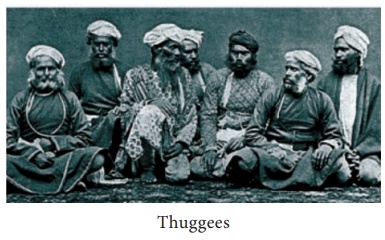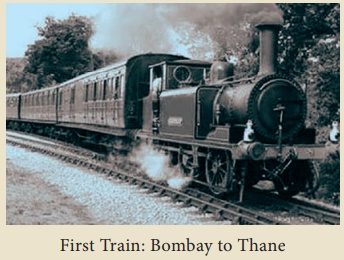Effects of British Rule - Efforts at Safety and Developmental Measures | 11th History : Chapter 17 : Effects of British Rule
Chapter: 11th History : Chapter 17 : Effects of British Rule
Efforts at Safety and Developmental Measures
Efforts at Safety and Developmental
Measures
Pindari War
Pindaris were freebooters composed of both Muslim
and Hindu bands. The Subsidiary Alliance of the Company had led to the
disbandment of thousands of soldiers and most of them joined them and swelled
their numbers in central India. The British proclaimed Pindari War. But it
turned out to be a war against Marathas and the outcome of this prolonged war
(1811 to 1818) was that the whole of Central India came under British rule.

Suppression of Thuggee
The Thugs were robbers operating between Delhi and
Agra from the fourteenth century. They were bound together by oaths and ritual
and murdered unsuspecting travellers in the name of the goddess Kali. Bentinck
placed William Sleeman in charge of the operation to eliminate the Thuggee
menace. Between 1831 and 1837 more than three thousand Thugs were convicted.
Five hundred became approvers. By 1860 the problem of thuggee had ceased to
exist.

Abolition
of Sati
Bentinck showed great courage and humanity by his
decision to abolish sati, the
practice of burning widows alive with the corpses of their husbands. Previous
governors-general were reluctant to prohibit the custom as an interference in
religion but Bentinck enacted a law (Sati Abolition Act, 1829) to put an end to
this practice. Raja Rammohan Roy’s campaigns and efforts played a decisive part
in getting this inhuman practice abolished.
Railways, Postal & Telegraph Systems
The first serious proposal for constructing
railways was made by the European business community. The Directors were
doubtful whether railways could be successfully built in India. Governor
General Dalhousie however persuaded them arguing that the railways would bring
very considerable economic advantage. Yet before the Great Rebellion less than
three hundred miles of track had been laid.
Though several proposals for the laying of telegraph communication between India and London were put forward, the telegraph service was inaugurated only in 1854. During the Great Rebellion of 1857 its importance was realised. In the aftermath of 1857, it became an urgent necessity. The time of communication between London and Calcutta came down from several days to twenty eight minutes. With the opening of Suez Canal in 1869, the journey between Europe and India was reduced by some 4000 miles. By1870 the government of British India was in effective contact with Secretary of State, India Office, London. Subsequently, with the exception of Curzon, Governor Generals were reluctant to do anything without seeking the permission of Whitehall, the headquarters of the East India Company.
The railway line from Bombay to Thane
was opened in 1853; from Howrah to Raniganj in 1854-55. The first railway line
in south India ran from Madras to Arakonam in 1856. Royapuram was one of the
railway stations inaugurated in that year.

Irrigation
The British neglected irrigation. The irrigation channels and tanks built by Indian rulers fell into disuse and there was little effort on the part of the Company to undertake repairs or renovation works. In Madras, as we will see in the following section, a few irrigation works were carried out because of the personal enthusiasm of Arthur Cotton, an Engineering officer. Against much opposition, Cotton built a dam across the Kollidam (Coleroon) in 1836. In 1853, a dam across the Krishna river had also begun. In the north, before the takeover of India by the Crown, Jumna canal was completed in 1830 and by 1857 the Ganges canal had been extended to nearly 450 miles.

In the Punjab area the Bari Doab canal had
been excavated by 1856. But the canal water contributed to soil salinity and
water logging causing great ecological distress.
Forests
Land revenue was the mainstay of the British Indian
government’s fiscal system. Therefore, in their effort to extend the areas of
cultivable land, forests were destroyed. Zamins were created out of Jungle
Mahal forests and auctioned off for regular cultivation. The original
inhabitants of this region, the Santhals were evicted. Therefore it was the
Santhals who were the first tribal group to resist the British rule in India.
Slope cultivation was encouraged in the hilly and mountainous tracts. Land was
provided to European enterprises at a throwaway price for slope cultivation.
Further, in their enthusiasm to try plantation crops, zamindars and Indian
rulers destroyed the forests. Coffee, for instance, did not grow in many
places. Yet in the process of attempting coffee cultivation large tracts of
virgin forests were destroyed. Timber came to be exploited with the massive
construction of the railway system. In the 1870s, it was calculated that every
year one million sleepers were needed to build railway tracks. Indian trees,
particularly sal, deodar, and teak, were preferred for their
strength over other Indian timbers. These three species were intensively
exploited. Much sal was extracted from the forests
Timber went to England too for the building of railways. The myth that India’s
forests were inexhaustible was exploded. It was in this background that the
colonial state, in order to manage and control forest resources, started the
Forest Department and passed the Indian Forest Act, 1865. This was a draconian
act which restricted the use of forest resources by indigenous groups who
resented it. In order to contain protest and resistance the British enacted the
dreaded Criminal Tribes Act, 1871. During the entire colonial period there were
frequent insurrections by tribal people against the colonial state. The legacy
of the colonial forest acts continues to haunt contemporary times as well.
Related Topics